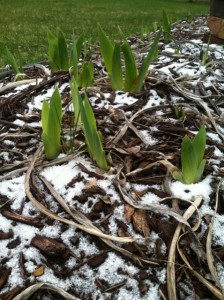My kids and I read a book about “the last snowflake” a few years ago. The book was a story about how the last snowflake felt as it hit the ground each winter – lonely because his friends were ahead of him and probably melted already, or maybe carefree and floating on the wind to say the last goodbye to winter. This year my kids and I keep trying to wonder when that last snowflake would fall. Was it a few weeks ago? No. Was it last weekend? No. Well, here it is snowing again today so will I see the last snowflake tonight? At some point this snow has to end – it’s late April! When WILL that last flake fall?
Plenty of people have written and sang about the “last snowflake” (do a web search and you’ll see). It’s a great thing to philosophize about: when will it come, what will it look like, will I miss it, am I ready for what comes after it, and, in general, how do I feel about the transition it represents? Am I glad to see that last snowflake of the season, or am I melancholy about it? Am I ready for the warmer weather, or did I like wearing warm sweaters and fleece pajamas? Do I like winter after all, even though it’s hard and long and seemingly never-ending, until it’s over? I like spring a lot but it’s always so short in Michigan and we head right into hot weather, there’s really not much in-between. Plus spring and summer mean the ramping up of activities and a busier schedule – am I ready for that? A part of me is already missing that last snowflake even though I don’t know if I have seen it yet….but then again, I’m pretty ready for winter to be over. Can I feel two things at once? Can I be sad and glad to see that last snowflake?
Why am I writing about snowflakes? Because I read a piece on the Red Hot Mamas website the other day about a menopausal woman’s last period that reminded me that of my thoughts about last snowflakes. In “A Gentle Good-bye,” Christine Merser talks about how she did not get to say goodbye to her last period at age 42, that it came too fast and she mourns (at least in part) the idea that she’ll never menstruate again. She acknowledges the hardships menstruation sometimes caused and the hassles that were part and parcel of it, but also reminisces in its life-giving qualities and feels a sense of loss. She feels her last period was a “benchmark moment” and suggests that in not knowing that her last period was indeed her last, she did not get to say that “gentle goodbye” that she wanted to say. She also talks about menopause as representing the “October” of her life, signifying ends rather than beginnings, but at the same time wants it to mean new and better things. The idea that the last period cannot be predicted but is hoped for, but then may be bittersweet when it’s finally reached is something that I’ve heard from so many women. Menstruation is hard, especially when it is unpredictable in perimenopause or before, but a part of it is also safe and representative of a kind of stability and identity that is hard to give up. Merser proposes that cessation of menstruation is the “first thing she can’t fix” about her body. Regardless of the freedoms that you might get when it’s over for good or the things about it that you will gladly give up, women aren’t always quite sure they really want to be done with menstruation forever once they sit back and think about its meanings. So they ask, Am I glad to see that last period, or am I melancholy about its passing? Am I ready for the midlife and beyond, or did I like being younger? Am I ready to give up my monthly reminders of womanhood? Do I like menstruation after all, even though it’s hard and long and seemingly never-ending until it’s over? I might like midlife a lot but it seems like it might be short and it might head me right into aging for real, so how long will I really be in this good midlife stage? Does a part of me miss my period before I’ve seen my last one?
Like snow, menstruation can be unpredictable, uncertain, burdensome, and a hassle, and we might all be very happy to say goodbye. BUT, for those of accustomed to the seasons and the good parts of each season, we might also be somewhat sad to see snow and menstruation leave us. Especially if we don’t get to say a chance to say goodbye.
Disclaimer: This analogy probably only works for those who live in Northern climates and are used to the good and bad things that come with snow. And yes, I’m sort of making light of menstruation here, but my feelings about the last snowflake this year are noticeable to me and I thought it might be fun to play with this analogy.



Heather, I think this analogy works perfectly. In Calgary where I live, our last snowflake could well be in July or August, so I totally get the idea of unpredictability. But this April has been different, with enough snow a couple of weeks ago to make it look like winter all over again. And despite the hassle and the frustration of yet another deferment on spring, it offered it’s own beauty and bittersweet reminder of what we do enjoy about winter. So the idea that you can appreciate menstruation and winter, but be glad to see both take their leave, cyclically or for good (some of us do retire to warmer, sunnier climes) makes total sense to me.
Yes, I can imagine this analogy works even better for you than me! Thanks, Laura.